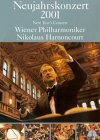 New Year's Day Concert 2001 | DVD | (03/12/2001)
from £41.16
| Saving you £-23.17 (N/A%)
| RRP
New Year's Day Concert 2001 | DVD | (03/12/2001)
from £41.16
| Saving you £-23.17 (N/A%)
| RRP The 2001 Vienna New Year's Day Concert was always bound to strike sparks. Having built his reputation in Baroque and early music, Nikolaus Harnoncourt has recently brought his re-creative insights to the standard Classical repertoire. How typical then that he should open proceedings with the original version of the Radetzky March--urbane compared to the familiar version, whose hearty militarism closes the concert in style. In between there's an enterprising selection of Strauss waltzes and polkas from Johanns I and II, the subtle and underrated Josef, and three numbers by Josef Lanner, whose restrained lilt provides the link between Schubert and the Strauss Family. Harnoncourt brings out the rhythmic vigour of this music, the astringent sound of woodwind and brass often heard over the strings, though there's no doubting the expressive sweep of the inevitable Blue Danube waltz. On the DVD: Directed for video by Brian Large, the atmosphere of the occasion comes over in full, aided by the tangibility of 16:9 picture format and 5.1 surround sound--though PCM Linear Stereo is also an option. Three ballet sequences, including a hilarious steam train race to Johann II's Excursion Train polka, are sensibly included as an appendix. Each of the 17 concert tracks is separately indexed, but still-frame histories of the event and of the Musikverein venue, edited from Clemens Hellsberg's booklet article, make for a poor special feature. Why no documentary film? However, this remains the best concert of its kind for almost a decade, and can safely be invested in as such. --Richard Whitehouse
![Gounod: Romeo et Juliette [1995]](/pictures/1028614.jpg) Gounod: Romeo et Juliette | DVD | (19/11/2001)
from £24.19
| Saving you £10.80 (44.65%)
| RRP
Gounod: Romeo et Juliette | DVD | (19/11/2001)
from £24.19
| Saving you £10.80 (44.65%)
| RRP A performance of Gounod's opera 'Romeo Et Juliette' in five acts recorded live at The Royal Opera House Covent Garden.
![Mefistofele - Boito [1989]](/pictures/1028340.jpg) Mefistofele - Boito | DVD | (30/06/2003)
from £N/A
| Saving you £N/A (N/A%)
| RRP
Mefistofele - Boito | DVD | (30/06/2003)
from £N/A
| Saving you £N/A (N/A%)
| RRP An exceptional performance of Arrigo Boito's 'Mefistofele' conducted by Maurizo Arena.
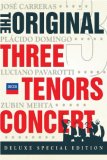 The Original Three Tenors Concert - Luciano Pavarotti/Placido Domingo/Jose Carreras | DVD | (18/06/2007)
from £4.99
| Saving you £12.00 (401.34%)
| RRP
The Original Three Tenors Concert - Luciano Pavarotti/Placido Domingo/Jose Carreras | DVD | (18/06/2007)
from £4.99
| Saving you £12.00 (401.34%)
| RRP Orchestra Del Maggio Musicale Fiorentino
![Concert In Honour Of Pope Benedict XVI [2007]](/pictures/1081401.jpg) Concert In Honour Of Pope Benedict XVI | DVD | (03/03/2008)
from £21.58
| Saving you £-1.59 (-8.00%)
| RRP
Concert In Honour Of Pope Benedict XVI | DVD | (03/03/2008)
from £21.58
| Saving you £-1.59 (-8.00%)
| RRP Live Recorded At The Aula Paolo VI Vatican On 27th October 2007
 American Ballet Theatre at the Met | DVD | (22/09/2003)
from £13.89
| Saving you £7.86 (64.80%)
| RRP
American Ballet Theatre at the Met | DVD | (22/09/2003)
from £13.89
| Saving you £7.86 (64.80%)
| RRP This DVD realease features a fine quartet of ballets recorded live at the Metroplitan Opera House New York in June 1984. This mixed bill shows off both the lyrical and the virtuoso qualities of this famous comapny. Les Sylphides: Chopin's stunning one act 'romantic reverie' was premiered by Diaghilev's Ballet Russes in 1909 with a cast including Anna Pavlova and Vaslav Nijinsky. Choreographer Michael Fokine revived this productionfor American Ballet Theatre's opening perfor
![Mozart: Le Nozze Di Figaro [Blu-ray]](/pictures/1089313.jpg) Mozart: Le Nozze Di Figaro | Blu Ray | (06/10/2008)
from £25.95
| Saving you £-3.96 (N/A%)
| RRP
Mozart: Le Nozze Di Figaro | Blu Ray | (06/10/2008)
from £25.95
| Saving you £-3.96 (N/A%)
| RRP Le Nozze Di Gigaro by Wolfgang Amadeus Mozart. Performed by Konzertvereinigung Wiener Staatsopernchor and Wiener Philharmoniker. Conducted by Nikolaus Harnoncourt.
![Tchaikovsky: Gala Tribute To Tchaikovsky [1993]](/pictures/1028622.jpg) Tchaikovsky: Gala Tribute To Tchaikovsky | DVD | (29/10/2001)
from £6.85
| Saving you £25.14 (367.01%)
| RRP
Tchaikovsky: Gala Tribute To Tchaikovsky | DVD | (29/10/2001)
from £6.85
| Saving you £25.14 (367.01%)
| RRP Recorded on December 1st 1993 this programme celebrates the centenary of Tchaikovsky's death.
 Wagner - Siegfried (Boulez, Bayreuther Festspiele) | DVD | (11/07/2005)
from £21.41
| Saving you £3.57 (19.38%)
| RRP
Wagner - Siegfried (Boulez, Bayreuther Festspiele) | DVD | (11/07/2005)
from £21.41
| Saving you £3.57 (19.38%)
| RRP The opera Siegfried.
 New Year's Day Concert 2002 | DVD | (13/02/2002)
from £N/A
| Saving you £N/A (N/A%)
| RRP
New Year's Day Concert 2002 | DVD | (13/02/2002)
from £N/A
| Saving you £N/A (N/A%)
| RRP The annual New Year's Day Concert is the traditional Strauss gala with the Vienna Philharmonic marking the turn of the calendar in the spectacularly beautiful Musikverein. For the first time in 2002 the concert was conducted by Seiji Ozawa and the light-hearted nature of the event finds this always engaging conductor at his most impishly playful. The works of Joseph and Johann Strauss more-or-less alternate, opening with Johann's Zivio! march and closing, 108 minutes later, with the traditional clap-along to the Radetzky-March. Among the polkas and waltzes, including a ravishing encore of the Blue Danube waltz, other highlights include the overture to Die Fledermaus, which gets the second half of the concert off to a rousing start. Johann's little known Perpetuum mobile controversially brings politics to the occasion, being used to mark the introduction of the Euro. Perhaps this is why it is immediately followed by a Danse Diabolique by Joseph Hellmesberger jnr, the one none-Strauss work in the programme? However, sly satire is soon forgotten as the delightful Elisen-Polka sweeps devilish thoughts away with its delightful melody. A wonderful time is had by all and while watching on TV can never recreate the atmosphere of being there it is all still hugely enjoyable. On the DVD: The New Year's Day Concert 2002 has possibly the first classical music DVD "director's cut", as prepared by the ever dependable veteran of classical music videos, Brian Large. What this means is that the four filmed inserts which were included in the broadcast version of the concert appear here as extras, the concert playing complete without ever leaving the hall. These and the concert itself are presented in an excellent 16:9 anamorphic picture. Sound defaults to good PCM stereo but there are options for a superior Dolby Digital 5.0 mix, and a wonderfully rich and atmospheric 5.0 DTS track. There are four trailers for further TDK music DVDs, a picture gallery of Seiji Ozawa, and a tourism promotional video for Vienna with noticeably poorer picture quality than everything else on the disc.--Gary S. Dalkin
![Strauss: Capriccio [Renèe Fleming, Bo Skovhus, Michael Schade, Angelika Kirchschlager] [Blu-ray] [2014]](/pictures/1133571.jpg) Strauss: Capriccio | Blu Ray | (05/05/2014)
from £31.82
| Saving you £-0.57 (N/A%)
| RRP
Strauss: Capriccio | Blu Ray | (05/05/2014)
from £31.82
| Saving you £-0.57 (N/A%)
| RRP Recording from the Vienna State Opera, 2013. To celebrate the 150th birthday of Richard Strauss C Major is releasing Capriccio for May. 'Ren e Feling is a world-class Countess: moving and intense.' - Der Kurier.
![Meyerbeer: L'Africaine [1988]](/pictures/1028633.jpg) Meyerbeer: L'Africaine | DVD | (03/09/2001)
from £N/A
| Saving you £N/A (N/A%)
| RRP
Meyerbeer: L'Africaine | DVD | (03/09/2001)
from £N/A
| Saving you £N/A (N/A%)
| RRP Enormously popular and influential in its time, Meyerbeer's L'Africaine has become a rarity--the conventions of grand opera which it embodies so thoroughly are only familiar as adapted by Verdi and Wagner, so this work usefully reminds us of how radical they were. Meyerbeer and his librettist Scribe give us a five-act plot full of confrontations and threats of death, a shipwreck and the suicide of the Indian heroine Selika and her rejected suitor by inhaling the poisonous aromas of a deadly tree. The expedition of Vasco Da Gama round the Cape of Good Hope and up to the spice ports of India becomes less a story about the crusade for profit and more a matter of messy triangular love affairs. Heavy fathers, Brahmin priests and Grand Inquisitors are handled with much facility and no intensity. What L'Africaine really amounts to is a singers' display piece, and the two principals here--Shirley Verrett as Selika and Placido Domingo as Vasco--are entirely up to its demands. Domingo reminds us that Vasco's Act 4 aria "Oh Paradis" was for decades a standard tenor showstopper. The other principals, Ruth Ann Svenson and Justino Diaz, are entirely admirable and Marco Arena and the San Francisco Opera give the work as a whole both the grandeur it certainly possesses and rather more subtlety than one might have expected. On the DVD: The DVD, presented in 4:3 ratio, and in PCM stereo, has no features apart from instructions and subtitles in French, German, English and Spanish. This failure to provide extras, or even an especially informative leaflet, becomes especially regrettable with a work whose conventions are now far out of the operatic mainstream. --Roz Kaveney
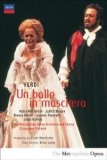 Luciano Pavarotti - Verdi - Un Ballo In Machera | DVD | (26/02/2008)
from £25.95
| Saving you £-3.96 (N/A%)
| RRP
Luciano Pavarotti - Verdi - Un Ballo In Machera | DVD | (26/02/2008)
from £25.95
| Saving you £-3.96 (N/A%)
| RRP Giuseppe Verdi - Un Ballo In Maschera.Live At The Metropolitan Opera on 16 February 1980.
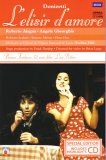 L'Elisir D'Amore - Donizetti | DVD | (13/06/2005)
from £N/A
| Saving you £N/A (N/A%)
| RRP
L'Elisir D'Amore - Donizetti | DVD | (13/06/2005)
from £N/A
| Saving you £N/A (N/A%)
| RRP It's hard to think of a couple better suited to play the romantic leads in Donizetti's comedy L'Elisir d'amore than husband-and-wife team Roberto Alagna and Angela Gheorghiu. Both are charming on stage, and both have voices to die for: Gheorghiu's dark liquid tones are particularly spine-tingling, and her coloratura abilities awe-inspiring, and though Alagna has mainly concentrated on the more spinto (powerful) roles of the tenor repertoire, in 1996 when this live production was recorded his voice was just a little fresher and lighter and thus perfect for the bel canto gracefulness of Donizetti's writing. His performance of "Una furtiva lagrima", for example, is meltingly sung and free from all temptation to overplay the high notes. Frank Dunlop's 1920s-set production doesn't quite produce the belly laughs some stagings manage (in Dulcamara's patter song, for example), but has a certain small-town wistful charm nonetheless. The orchestral accompaniment under Donizetti expert Evelino Pidò is spot on, and never falls into the banal "oom-pah" trap that such simple writing can often lead to. Overall, it's a production of great charm. On the DVD: L'Elisir d'amore comes to disc with a 52-minute film on the history of the opera and its recording, with contributions from Alagna and Gheorghiu, and subtitles in English, French, German, Spanish and Chinese. The Lyon opera house is particularly well set up for video recording, and Brian Large does a sophisticated job of capturing a live performance: it's hard to believe at some points that the cameras aren't actually on stage in the middle of the action. Just occasionally this leads to the singers not knowing where to look and seeming a trifle lost, but generally the performances work superbly well on the small screen. --Warwick Thomson
![Mozart: Cecilia Bartoli Sings [DVD]](/pictures/1109382.jpg) Mozart: Cecilia Bartoli Sings | DVD | (07/04/2003)
from £20.69
| Saving you £-0.70 (N/A%)
| RRP
Mozart: Cecilia Bartoli Sings | DVD | (07/04/2003)
from £20.69
| Saving you £-0.70 (N/A%)
| RRP Performed at the Styriarte Festival in Graz with Nikolaus Harnoncourt conducting. Also includes Mozart's Symphony No 38.
![Puccini: Turandot -- San Francisco [1994]](/pictures/1074093.jpg) Puccini: Turandot -- San Francisco | DVD | (18/07/2000)
from £N/A
| Saving you £N/A (N/A%)
| RRP
Puccini: Turandot -- San Francisco | DVD | (18/07/2000)
from £N/A
| Saving you £N/A (N/A%)
| RRP Not only is Puccini's final opera Turandot among the composer's most popular works, but following The Three Tenors and a certain football contest, it has in "Nessun dorma!" what is almost certainly the best-loved aria in all opera. Written 20 years after Madame Butterfly (1904), Puccini's version of an 800-year-old fairy-tale is set in a legendary Peking and scored on a grand scale, incorporating not only Chinese musical techniques but a vast range of oriental percussion. Puccini draws heavily on the chorus, and as ever makes intense demands on his heroine, to which Eva Marton rises powerfully, very well complemented by the tenor Michael Sylvester as Calaf. However, what makes this 1994 San Francisco Opera version so enchanting as a visual experience is the realisation by David Hockney, who not only designed the sets and costumes but also directed the production. His vision is highly stylised, richly imagined, atmospheric and very beautiful, and it is a testament to how well this version is directed that much of the original magic is communicated through the confines of a TV screen. --Gary S. DalkinOn the DVD: Other than a well-appointed booklet, and the option to watch with or without subtitles, there are no special features. The 4:3 picture is a major improvement on video, though no doubt due to the original source materials, not as detailed as the best DVDs. The sound is powerful PCM stereo, with a slight tendency to become strident at especially dramatic moments. The layer change is particularly badly done, interrupting the choir in full flow, rather than being placed between tracks.
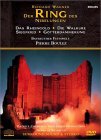 Wagner: Der Ring des Nibelungen -- Complete | DVD | (15/10/2001)
from £N/A
| Saving you £N/A (N/A%)
| RRP
Wagner: Der Ring des Nibelungen -- Complete | DVD | (15/10/2001)
from £N/A
| Saving you £N/A (N/A%)
| RRP ![Cecilia Bartoli, Nikolaus Harnoncourt -- Haydn [2001]](/pictures/1028365.jpg) Cecilia Bartoli, Nikolaus Harnoncourt -- Haydn | DVD | (19/05/2003)
from £20.69
| Saving you £-0.70 (N/A%)
| RRP
Cecilia Bartoli, Nikolaus Harnoncourt -- Haydn | DVD | (19/05/2003)
from £20.69
| Saving you £-0.70 (N/A%)
| RRP CECILIA BARTOLI CONCENTUS MUSICUS WIEN CONDUCTED BY NIKOLAUS HARNONCOURT.Cecilia Bartoli in sensational form for a landmark performance of music by Haydn with Nikolaus Harnoncourt and his Concentus Musicus Wien recorded at a concert performance in Graz Austria.
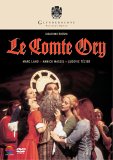 Le Comte Ory - Glyndebourne Festival Opera | DVD | (27/06/2005)
from £N/A
| Saving you £N/A (N/A%)
| RRP
Le Comte Ory - Glyndebourne Festival Opera | DVD | (27/06/2005)
from £N/A
| Saving you £N/A (N/A%)
| RRP Set in rural France at the time of the crusades Rossini's last comic opera is the saucy tale of Le Comte Ory and his pursuit of the crusaders' wives who chastely await the return of their menfolk. This acclaimed production was recorded at Glyndebourne during the 1997 season with the delectable French soprano Annick Masis as Adele the Belgian tenor Marc Laho as the lecherous Comte Ory and Diana Montague as the amorous page Isolier. Jerome Savary's sparkling production includes a sensuous bathing scene and a riotous banquet with the male singer disguised as nuns. Andrew Davis conducts the London Philharmonic.
![Valery Gergiev Conducts The Vienna Philharmonic Orchestra [2000]](/pictures/1028511.jpg) Valery Gergiev Conducts The Vienna Philharmonic Orchestra | DVD | (01/07/2002)
from £20.00
| Saving you £-0.01 (N/A%)
| RRP
Valery Gergiev Conducts The Vienna Philharmonic Orchestra | DVD | (01/07/2002)
from £20.00
| Saving you £-0.01 (N/A%)
| RRP Valery Gergiev's career knows few bounds, and this concert from the 2000 Salzburg Festival finds him guiding the Vienna Philharmonic through three 20th-century Russian classics with typically edge-of-seat charisma. After a ponderous start, Prokofiev's Classical Symphony goes with style and subtlety. Alfred Schnittke's Viola Concerto has the extreme emotional range expected of this still-controversial composer, but soloist and dedicatee Yuri Bashmet covers all bases in this powerfully focused account. The concert ends with Stravinsky's ballet The Firebird in its complete 1910 version (ignore what it says in the next-to-useless booklet note). If lacking the vividness that Gergiev's Kirov orchestra would bring to it, there's no doubting the sophistication or the commitment of the Vienna players. Gergiev's conducting grows more unorthodox by the year--at times evoking a shamanistic Max Bygraves--but his energy and communicating zeal are something else. On the DVD: Valery Gergiev conducts the Vienna Philharmonic Orchestra is presented on DVD in a 16:9 aspect ratio that reproduces Brian Large's incisive direction with the expected clarity; plus there's a choice of PCM Stereo, Dolby 5.1 or DTS options. The special feature--subtitled in four European languages--consists of a chat with Gergiev on Prokofiev and Stravinsky, and a lengthier conversation with Bashmet on his association with Schnittke and the genesis of the Viola Concerto, with enough amusing anecdotes to keep listeners intrigued while listening to the music. --Richard Whitehouse

Please wait. Loading...
This site uses cookies.
More details in our privacy policy